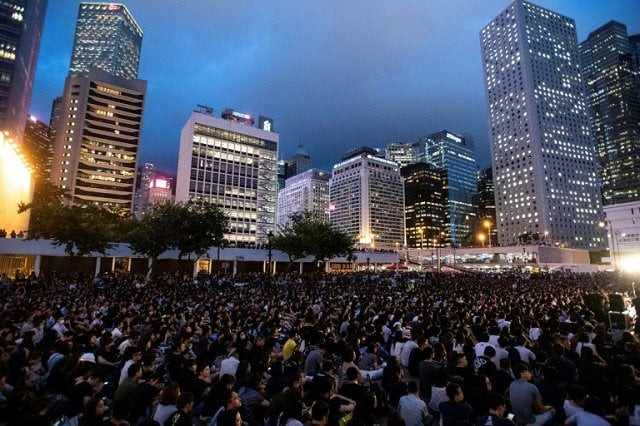Crisis-hit Hong Kong: China's gateway to the world
The global financial hub has been shaken by 10 weeks of pro-democracy

Weeks-long unrest has plunged the city into its deepest crisis in decades. PHOTO: AFP
The global financial hub has been shaken by 10 weeks of pro-democracy protests which could have an impact worse than the 2008 global economic crisis, Hong Kong leader Carrie Lam has warned.
Such a downturn would also hit China, which relies on the city for raising capital and for providing robust legal and financial institutions -- areas where the mainland economy still lags despite its much bigger size.
China moving troops to Hong Kong border, says President Trump
"Hong Kong's importance to the Chinese economy is disproportionate to its size," Tianlei Huang of the Peterson Institute of International Economics wrote in an analysis.
"Since... 1997, China has developed massive economic and business interests in the territory. The Chinese leadership realises that for the sake of its own prosperity, China still needs a capitalist Hong Kong."
The ballooning of Chinese business interests in Hong Kong is down largely to the ease with which capital can flow through the semi-autonomous territory, analysts said.
Despite its rapid growth into the world's second-largest economy, the mainland does not enjoy the same internationally recognised regulatory framework and openness as Hong Kong, which was ranked fourth in the World Bank's ease of doing business index for 2019.
Mainland China was 46th.
That advantage has translated into billions of dollars in investment flowing through the city.
Nearly 60 per cent of investment flowing out of China goes through Hong Kong, according to the Hong Kong Trade Development Council.
This includes finances for projects that are part of President Xi Jinping's flagship Belt and Road international infrastructure drive.
And it goes both ways: Hong Kong is the biggest source of overseas direct investment into the mainland economy, the HKTDC says.
The city was also the mainland's fourth-largest trading partner in 2018.
Hong Kong has one of the top stock markets in the world which has attracted a huge number of Chinese firms, including state-run enterprises.
Of the 10 biggest IPOs in Hong Kong since 1986, nine were Chinese and included state-owned enterprises, according to HKEX, which runs the Hang Seng Index.
It already trades shares in huge Chinese firms like tech giant Tencent and insurer Ping An, and may soon list e-commerce titan Alibaba, which currently trades only in New York.
This link means mainland firms -- whose capitalisation is 68 per cent of the total market, according to the HKTDC -- stand to suffer from the crisis.
"The ability of (Hong Kong) to raise capital for Chinese companies will be eroded should the political instability... persist," said Ming Sing, a professor at the Hong Kong University of Science and Technology.
Hong Kong enjoys freedoms and systems -- including an independent judiciary -- unseen on the mainland as part of the handover agreement with Britain, its former colonial ruler.
This legal system -- described as "world class" in a Bank of East Asia economic analysis published in April -- provides companies, including mainland firms, a base for not only registration and operations but also dispute resolution.
It is also an independent customs territory under the World Trade Organization.
"US, European and also Asian multinationals want their contracts to be signed in Hong Kong because they'll be covered by British-style laws and regulations," said political analyst Willy Lam of the Chinese University of Hong Kong.
Hong Kong protesters kick off three-day airport rally
"Whereas if they sign in Shanghai, there is no comparable protection."
It also provides a level of security for investors, including those from mainland China. And they would not want the crisis to rock the economy, said Lam.
"There are massive investments in Hong Kong by the so-called Red Aristocracy," he said, referring to members of the Chinese leadership.
"The (mainland) upper crust... have huge investments in Hong Kong, that's why they don't want the stock market and the property market to crash."





1725099588-0/BeFunky-(41)1725099588-0-208x130.webp)













COMMENTS
Comments are moderated and generally will be posted if they are on-topic and not abusive.
For more information, please see our Comments FAQ